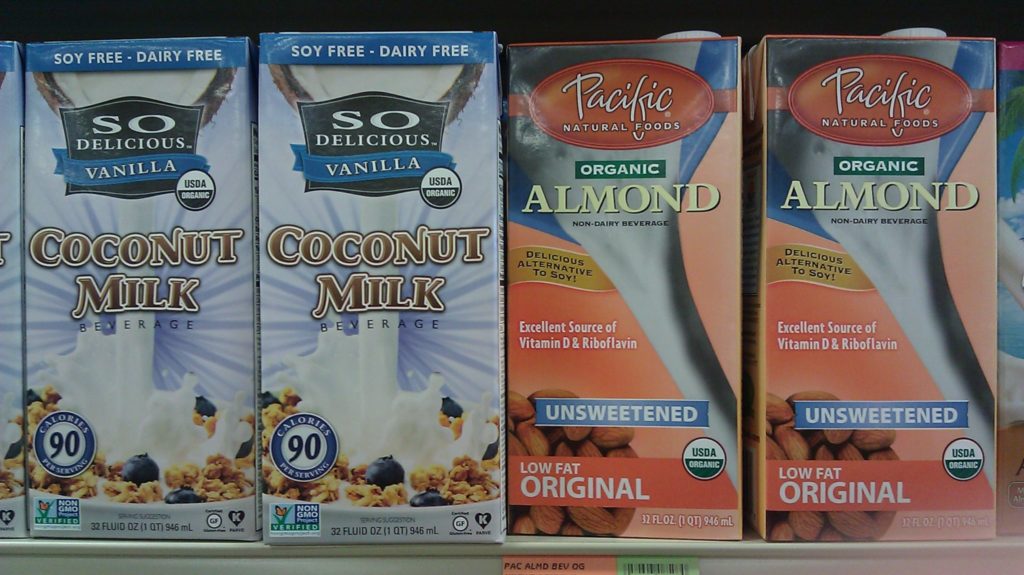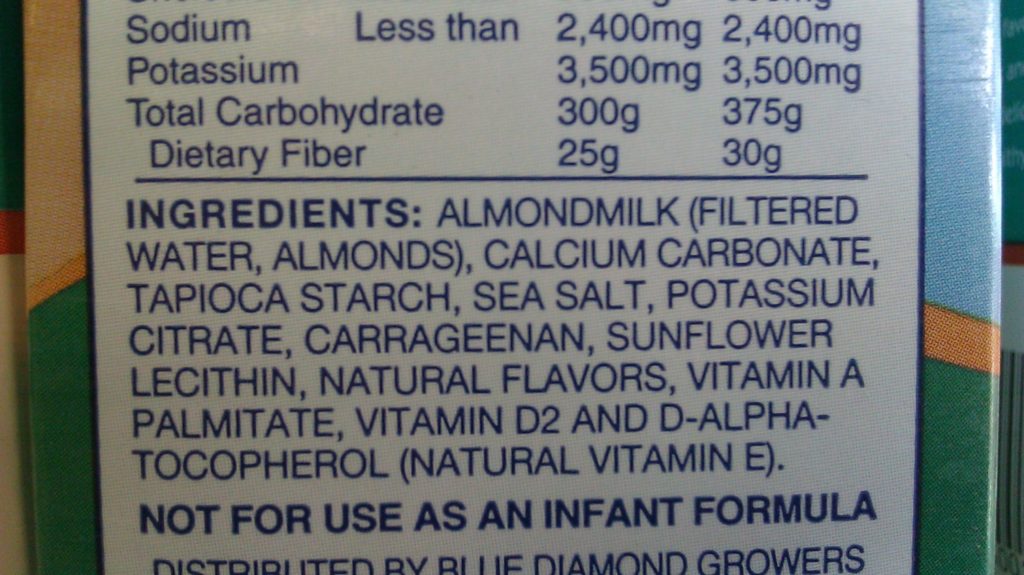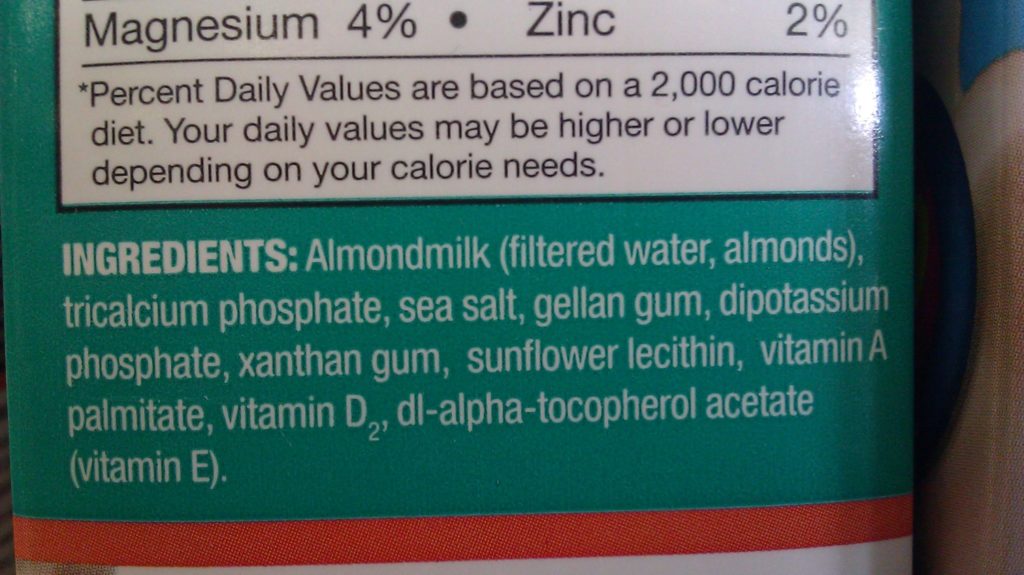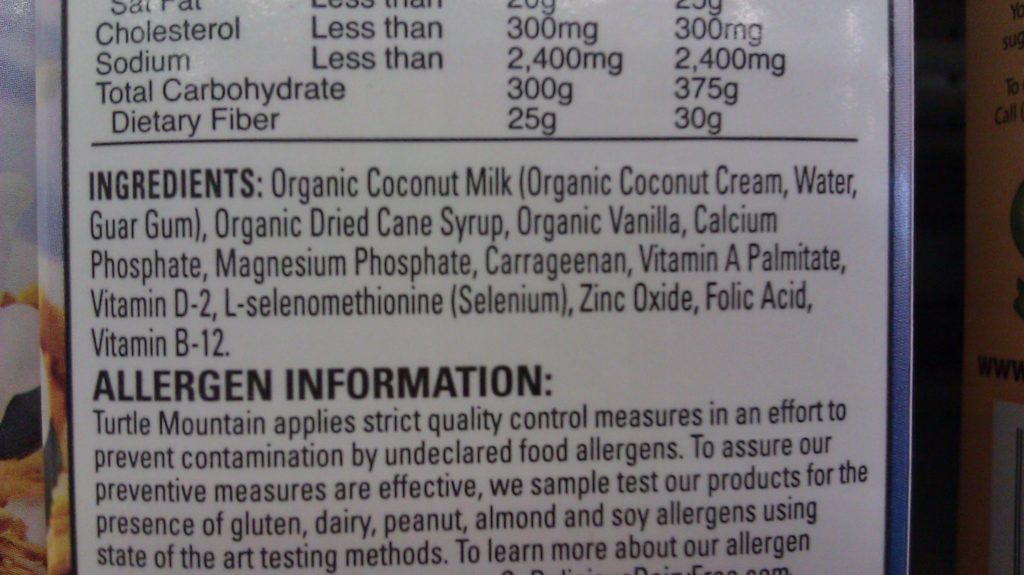 Organic coconut milk and almond milk are common purchases at the health food store by those with dairy allergies. Usually, these people are savvy consumers who know enough nutritionally to avoid soy milk with its endocrine disrupting isoflavones and gastric inflaming phytates. Rice milk is also steadily declining in popularity as it is really not much more than a glass of sugar water nutritionally speaking.
Organic coconut milk and almond milk are common purchases at the health food store by those with dairy allergies. Usually, these people are savvy consumers who know enough nutritionally to avoid soy milk with its endocrine disrupting isoflavones and gastric inflaming phytates. Rice milk is also steadily declining in popularity as it is really not much more than a glass of sugar water nutritionally speaking.
Organic, unsweetened coconut milk and almond milk in cartons seem like great alternatives at first blush, but are they really as “healthy” as people believe?
Let’s take a look at the labels. I was shocked at what I found.
Check out the labels of the three brands I photographed. I checked all the brands, by the way, and they all contained the same dangerous additives I’m about to describe.

First, Vitamin A Palmitate is added, the synthetic version of Vitamin A. I personally avoid synthetic versions of Vitamin A like the plague. Every single multi-vitamin I’ve ever examined contains some form of synthetic A, including the so called “whole foods” multis.
Synthetic vitamins are the chemical mirror images of the real, natural versions. They can cause imbalances over time. Even small amounts of the synthetic fat soluble vitamins like Vitamin A can prove toxic and should be strictly avoided!
The Organic Consumers Association warns that isolated vitamins such as those produced synthetically cannot be recognized or metabolized by the body in the same way as the natural version.

Large doses of natural vitamin A are well tolerated by the body as established by researchers decades ago, however. Traditional diets contain 10 times or more of the RDA of this nutrient with no ill effect. However, synthetic vitamin A is associated with birth defects and bone fractures. It has no benefit in the diet whatsoever.

The second really bad additive in these organic cartons of coconut milk and almond milk is Vitamin D2. Vitamin D2 is a form of the wonder vitamin that you should take great pains to avoid.
In all known cases of Vitamin D toxicity where the dose was intentional, Vitamin D2 was the culprit. By comparison, Vitamin D3 is much less toxic and requires an enormous or even an accidental dose to produce any toxic effect.
Vitamin D2 is manufactured industrially by irradiating yeast. It is dangerous for D2 to be added to any food product particularly if this product would be given to children, where toxicity symptoms would appear at much lower dosages.
None of the store brands of cartoned coconut milk or almond milk were free of these dangerous and synthetic versions of the fat soluble vitamins!
Notice also that carrageenan is present in 2 of the 3 products as well! Dr. Andrew Weil has been telling people to avoid carrageenan since 2002.
Carrageenan is so toxic and inflaming to the human digestive system that this food additive is formally classified by the International Agency for Research on Cancer (part of the World Health Organization) as a potential human carcinogen.
In my view, it would be a mistake to purchase and consume these items. They are in no way health promoting or beneficial, particularly for growing children!
Healthy Alternatives to Coconut Milk and Almond Milk in Cartons
Coconut milk and almond milk should be healthy and they can be if they are produced at home without these dangerous additives. I wrote an in depth post on how to easily make these nondairy beverages yourself. This recipe for wild rice milk is a good option as well.
Believe it or not, even organic coconut milk in BPA free cans would be a better alternative to cartons of coconut milk based on my label inspection!
Check out my video on homemade coconut milk and my article on how to make healthy DIY almond milk, fermented to add probiotics and enzymes to boost immunity and improve digestion.
Sarah, The Healthy Home Economist
Sources
From Seafood to Sunshine: A New Understanding of Vitamin D Safety





My dd, 13, and I recently had a check up and blood work with our doctor. Both of us were quite low in Vit D (23 and 28, respectively) which was surprising as we take FCLO, ghee daily and she drinks raw milk and has full cream ice cream daily. Doctor recommended sublingual D3. Wondered what you think about the label info: Bluebonnet D3 drops provide natural D3 (cholecalciferol) from lanolin, medium chain triglycerides, orange and lemon essential oils for flavor.
We were both low, but not nearly as bad, in B12 at 512 and 571. Doctor also recommended we take B12 drops. Subligual B Total includes B2, B3, B5, B6, B12, folic acid in a base of distilled water, vegetable glycerine, sorbitol, citric acid, sodium bicarbonate, fruit flavors, and sodium benzoate.
She also put me on niacin for liver function. Metagenics Niatain. Niacin as nicotinic acid. Other ingredients: microcrystalline cellulose, hypromellose, stearic acid, silica, and coating (water, hypromellose, medium chain triglycerides, and hydroxypropylcellulose.
Wow, that was hard to type 🙂
Normally we take no vitamins or rx drugs. I chose to add the above to get our levels up but not to take them permanently. After reading your blog today, I took a look at the ingredients. If this is terrible for us to take (please comment your thoughts), what else are we to do to up our vitamins? We eat a good diet of grassfed beef, pastured chicken and eggs, milk, etc.
Thank you!
I don’t recommend taking vitamin D even D3 in isolation and will be blogging more about this in the near future.
Will someone please explain the deal with carageenan? I’ve heard it’s bad so many times, but I’ve also heard it’s good. What’s the deal?
I just asked on their FB page, we’ll see if I get a response.
This is GREAT information for a real food regular. On the other hand, someone out there making a switch from regular milk to almond or coconut milk is still on a better road than drinking the regular old store brand milk. We see people in the office who are just starting and learning what real food is, so getting them to take baby steps is important! (They are happy to tell they are making a switch) Then eventually make the steps to pure almond & coconut milk and raw milk.
I don’t agree with that. I also don’t agree with baby steps approach. If you want to reclaim your health, you must dive off the cliff and make SIGNIFICANT changes. Baby stepping leads to frustration and lack of progress in my experience.
Also, I don’t agree that that cartoned coconut milk and almond milk is better than store milk. All three are terrible. The better transition would be low temp pasteurized, non homegenized milk if one is stepping up to raw milk from a local farm.
Sarah, I have to respectfully disagree! When people DIVE in to anything, the excitement fizzles…relationships, diets, poor financial decisions! For food, I believe very strongly in a gentle, baby step approach. You know a lot about food so it is easy for you to point out all of the things that need to change in a person’s diet. A person new to real food won’t know all of these things and will feel overwhelmed! Baby steps is key to allowing them to learn, research and make educated decisions without getting overwhelmed. Any baby step they make gets them one step healthier and one step further from the SAD diet. I actually have heard you say before what changes should be made first – which means you don’t expect someone to make them all at once!
Rachel I think a baby step approach is a great way to help educate people on what changes need to be made -understanding that the end goal is ALL the changes will be made 🙂
Im so pissed about this! HOW are they allowed to put ‘All Natural’ on the front of the carton of Blue Diamond Almond milk and in the ingredients are Vitamin A Palmitate AND Vitamin D2 etc…??????????????????????????????????????????????????????????????
FDA – I knew but I do only have a carton of one or the other once a month, all things in small amounts. We don’t need dairy at all, once we are not at the mother’s breast. If we want protein, calcium or D3 or anything, it is in the plant world. To be completely open, admitting that I do eat “clean” red meat and poultry that has been raised pasture fed and had a good life, though thinking of the vegan and more peaceful life. But saying we do not NEED dairy at all. If you are making milk from almonds or coconut, try adding some organic seaweed extract or powder that is all natural, truly natural, for extra supplementation too. But do this just before you drink not letting the serving set because it could take on a fishy taste, being seaweed and all.
Does this apply to the refrigerated cartons?
We’ve made almond milk at home, but it wasn’t much cheaper so we just buy it. Now, we’re going to make it for sure. I’m so bummed about this. Thankfully it’s simple to make.
It’s so frustrating when you think you are buying a healthier option for your family, and find out it really isn’t. It’s just wrong that they put so much crap into so many of the foods we eat.
Does anyone have any thoughts to Hemp milk in the carton? That is what I use for everything. I know it has vitamins and minerals but are they the bad ones?
Sheesh. I had actually made the same observations, trying to find alternatives to milk for my 20 month old. She was throwing up milk, even raw milk. She seems to do ok on rice milk and some of the lactose free milk but I’m not comfortable with either. And the D2 is a big red flag for me. I struggle with trying to figure out what to give her. Maybe…we could try raw milk again… Hm. I really think it’s the lactose she is having issues with. We tried kefir but she won’t drink it. She LOVES coconut milk but it’s way too expensive. Grumble. Sometimes it feels like the world is working against me.
You can easily make coconut milk from dried/fresh coconut and water. If you search Sarah’s site, you’ll find the post and video. Same with almond milk – very easy to make.
I make a coconut milk tonic for my 2.5 year old and have since she was weaned. I actually got the recipe from Sarah. You can buy “Native Forest Organic Coconut Milk” on Amazon.com and do the subscribe & save option where you save 15% I believe and get free shipping. We have it shipped 1x/month and it’s 12 cans for roughly $22. Not too bad if you compare it to the cost of buying raw milk in our area especially considering how much my little one drinks. It’s 1 can of coconut milk + 1 quart H2O, 2-3 TBSP Grade B Maple Syrup or Honey, and 1 tsp Vanilla. Mix/shake well and store in fridge, will keep up to 4 days (ours usually doesn’t last that long!)